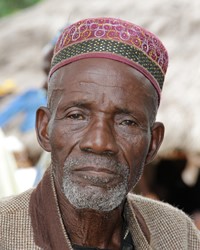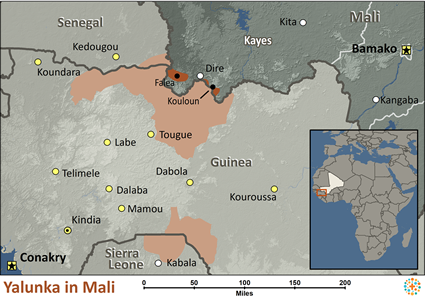The Yalunka are a Mandingo people who were one of the original inhabitants of the Futa Jallon (or Fouta Djalon), a mountainous region in West Africa. The region is the source of the headwaters of the Gambia, Niger and Senegal Rivers. The Yalunka are also known as the Dialonke or Jallonke which literally means "inhabitants of the Jallon (mountains)."
In the eighteenth century many of the Yalunka were dispersed by the Fulani, a powerful people group in the region. Today, the Yalunka are concentrated mostly in the country of Guinea. Some also live in Senegal, southwestern Mali, and northeastern Sierra Leone.
Their language, also called Yalunka, belongs to the Mandingo branch of the Niger-Congo language family. Yalunka is easily understood by those who speak Soso, another Mandingo language. In fact, the Yalunka often refer to themselves as Soso, and some scholars see the two as one group.
The Yalunka homeland has tall grass with a few trees and some bush areas. The country is hilly, and most of it is 1,000 to 2,000 feet above sea level. Since the 1950s, many Yalunka have migrated to West African cities such as Freetown to find wage-paying jobs. Many Fulani and Mandingo have moved into the Yalunka region, creating a multi-cultural environment.
The Yalunka in Mali are primarily subsistence farmers, with rice and millet being their staple crops. They grow peanuts, sweet potatoes, maize and beans as well. They have chickens, herds of cattle, and flocks of sheep and goats. Goats and cattle are especially important because they serve as bride-price payments. The animals are given to the girl's family before the marriage takes place. These animals are also valuable as a means of economic exchange and are used for providing milk.
Among the Yalunka, the children herd the cattle, the women milk the cows, churn the butter, and help the men in some of the agricultural work. Honey is another important commodity among the Yalunka. They gather honey by suspending large water-tight baskets in trees. The bees use the baskets as hives. Every year, they gather between four and six gallons of honey from each basket.
They live in round huts that have brick walls and cone-shaped, straw-thatched roofs. Within the village or settlement, the huts are grouped in compounds around a courtyard and are surrounded by a fence.
The Yalunka in Mali prefer to live in large settlements and villages. Many of the large settlements have remained in their current locations since the eighteenth century.
Part of socialization for Yalunka youth involves the Bondo secret societies. These teach the next generation about issues of sex, fertility and adulthood.
Yalunka society is basically patriarchal which means that the family households are headed by the men. A household typically consists of a man, his wife or wives, and their unmarried children. The family is the major social unit for the Yalunka in Mali. Extended households, which consist of two or more married men and their families, may also adjoin the nuclear family, forming an extended family compound. Polygyny (having multiple wives) is a common practice among the Yalunka. According to Islamic law, a man may have up to four wives. However, his first wife has authority over any subsequent wives. The husband has complete control over his wives but he also has the responsibility to feed and clothe them. He also helps the wives' parents when necessary. The wives' duties include maintaining the house, preparing the meals, washing the clothes and helping with the farm work.
The Yalunka in Mali are nearly all Muslim, but they have a love/hate relationship with Islam, a religion forced upon them by conquerors. At one point they renounced Islam but embraced it again after being conquered by a more powerful Muslim people.
Although they follow most of the religious teachings of Islam and observe its rituals and ceremonies, they retain many pre-Islamic beliefs. They practice Barinkiina, involving making sacrifices to their ancestors with the goal of gaining power. They continue to believe in N'iena (nature spirits) and make regular sacrifices to them. Some of the N'iena are said to be good spirits, helping with rice production and fertility in women, while others are believed to be evil, living in the bush and stealing children from their parents.
The Yalunka also believe that witches have the power to change into animals and cause harm to the villagers. Some put curses on victims' houses to ruin their crops. Diviners or sorcerers perform special rituals to keep the witches and evil N'iena away from farms and households.
The Yalunka have the Bible translated into their language. Fear of persecution has prevented all but a few Yalunka from putting their faith in Christ. They need consistent missionary effort and people who will faithfully intercede for them, tearing down the spiritual strongholds that keep them from receiving the abundant life only Christ offers.
Pray for the Holy Spirit to give Yalunka people in Mali such spiritual hunger that they will gladly lose all for the sake of Christ.
Pray for believers who understand and appreciate Yalunka music to write songs for them that will teach from the Bible.
Pray for the Holy Spirit to anointed workers to go to the Yalunka people in Mali.
Pray for the Lord to provide for an abundant harvest as a testimony of his goodness and sovereignty.
Pray for the Holy Spirit to work in the hearts and minds of Yalunka leaders in Mali so that they will open the door to people giving Christ the kingship of their lives.
Pray for a movement to Christ among the Yalunka people in Mali.
Pray for the Holy Spirit to give the Yalunka people teachable and understanding hearts.
Scripture Prayers for the Yalunka in Mali.
https://en.wikipedia.org/wiki/Yalunka_people
| Profile Source: Joshua Project |


























